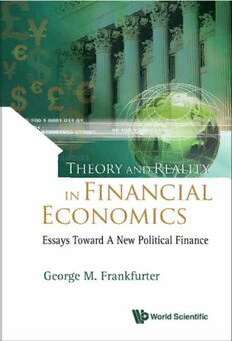
Theory and Reality in Financial Economics: Essays Toward a New Political Finance PDF
238 Pages·2007·2.361 MB·English
Most books are stored in the elastic cloud where traffic is expensive. For this reason, we have a limit on daily download.
Preview Theory and Reality in Financial Economics: Essays Toward a New Political Finance
Description:
The current literature on financial economics is dominated by neoclassical dogma and, supposedly, the notion of value-neutrality. However, the failure of neoclassical economics to deal with real financial phenomena suggests that this might be too simplistic of an approach. This book consists of a collection of essays dealing with financial markets' imperfections, and the inability of neoclassical economics to deal with such imperfections. Its central argument is that financial economics, as based on the tenets of neoclassical economics, cannot answer or solve the real-life problems that people face. It also shows the direct relationship between economics and politics something that is usually denied in academic models, given that science is supposed to be value-neutral. In this thought-provoking and avant-garde book, the author not only exposes what has gone wrong, but also suggests reforms to both the academic and the political economic systems that might help make markets fair rather than efficient. Drawing on interdisciplinary fields, this book will appeal to readers who are interested in finance, economics, business, the political economy and philosophy.
See more
The list of books you might like
Most books are stored in the elastic cloud where traffic is expensive. For this reason, we have a limit on daily download.
